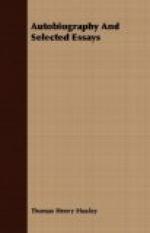[Footnote 30: Newton, Sir Isaac (1642-1721): a distinguished natural philosopher of England. Newton was elected a member of the Royal Society in 1672. His most important scientific accomplishment was the establishing of the law of universal gravitation. The story of the fall of the apple was first related by Voltaire to whom it was given by Newton’s niece.]
[Footnote 31: “Philosophical Transactions”: the publications of the Royal Society.]
[Footnote 32: Galileo (1564-1642): a famous Italian astronomer. His most noted work was the construction of the thermometer and a telescope. He discovered the satellites of Jupiter in 1610. In 1610, also, he observed the sun’s spots. His views were condemned by the Pope in 1616 and in 1633 he was forced by the Inquisition to abjure the Copernican theory.]
[Footnote 33: Vesalius (1514-1564): a noted Belgian anatomist.]
[Footnote 34: Harvey (1578-1657): an English physiologist and anatomist. He is noted especially for his discovery of the circulation of the blood.]
[Footnote 35: Subtle speculations: Selby gives examples from questions discussed by Thomas Aquinas. Whether all angels belong to the same genus, whether demons are evil by nature, or by will, whether they can change one substance into another, . . . whether an angel can move from one point to another without passing through intermediate space.]
[Footnote 36: Schoolmen: a term used to designate the followers of scholasticism, a philosophy of dogmatic religion which assumed a certain subject-matter as absolute and unquestionable. The duty of the Schoolman was to explain church doctrine; these explanations were characterized by fine distinctions and by an absence of real content. See Roger’s A Student’s History of Philosophy; also Baldwin’s Dictionary of Philosophy and Psychology.]
[Footnote 37: “writ in water”: an allusion to Keats’ request that the words “Here lies one whose name was writ in water” be his epitaph. The words are inscribed on his tomb in the Protestant Cemetery at Rome.]
[Footnote 38: Lord Brouncker: The first president of the Royal Society after its incorporation in 1662 was Lord Brouneker.]
[Footnote 39: revenant: ghost.]
[Footnote 40: Boyle: Robert Boyle (1627-1691): a British chemist and natural philosopher who was noted especially for his discovery of Boyle’s law of the elasticity of air.]
[Footnote 41: Evelyn (1620-1706): an English author and member of the Royal Society. His most important work is the Diary, valuable for the full account which it gives of the manners and customs of the time.]
[Footnote 42: The Restoration: In English history the re-establishing of the English monarchy with the return of King Charles ii in 1660; by extension the whole reign of Charles ii: as, the dramatists of the Restoration. Century Dictionary.]




